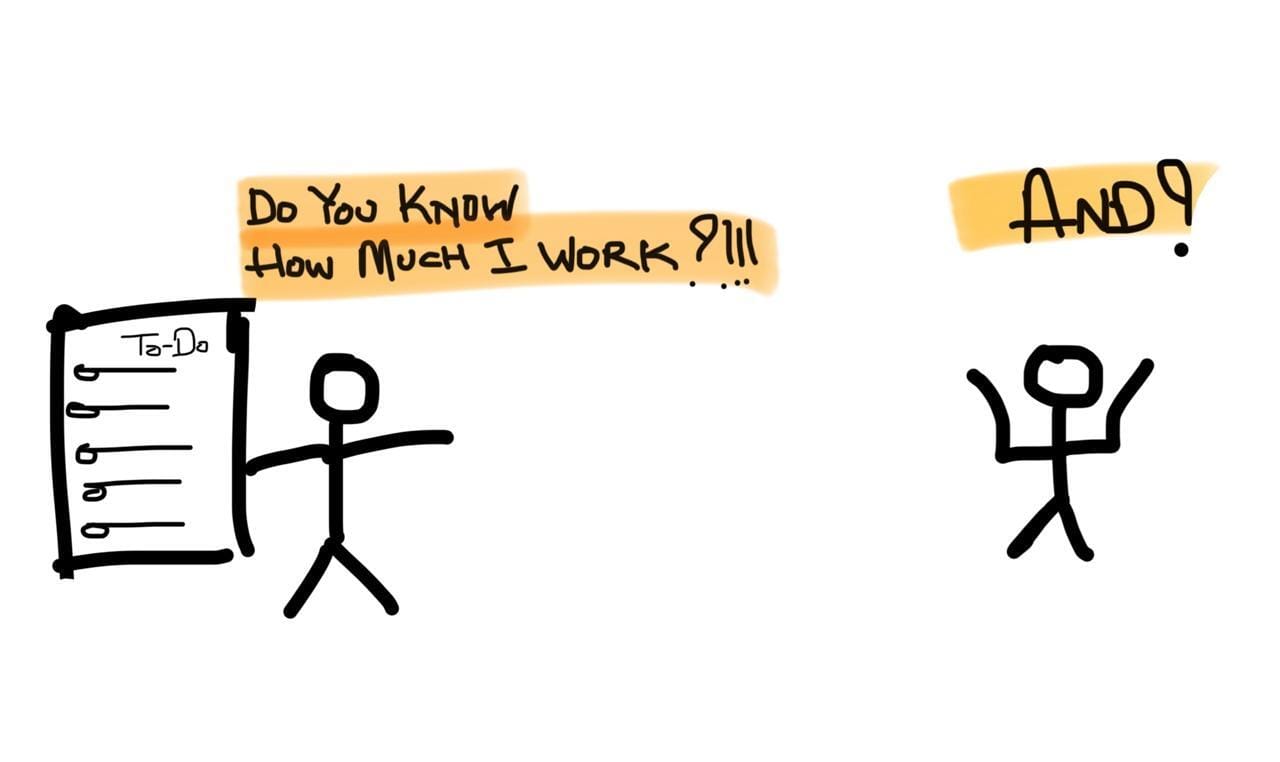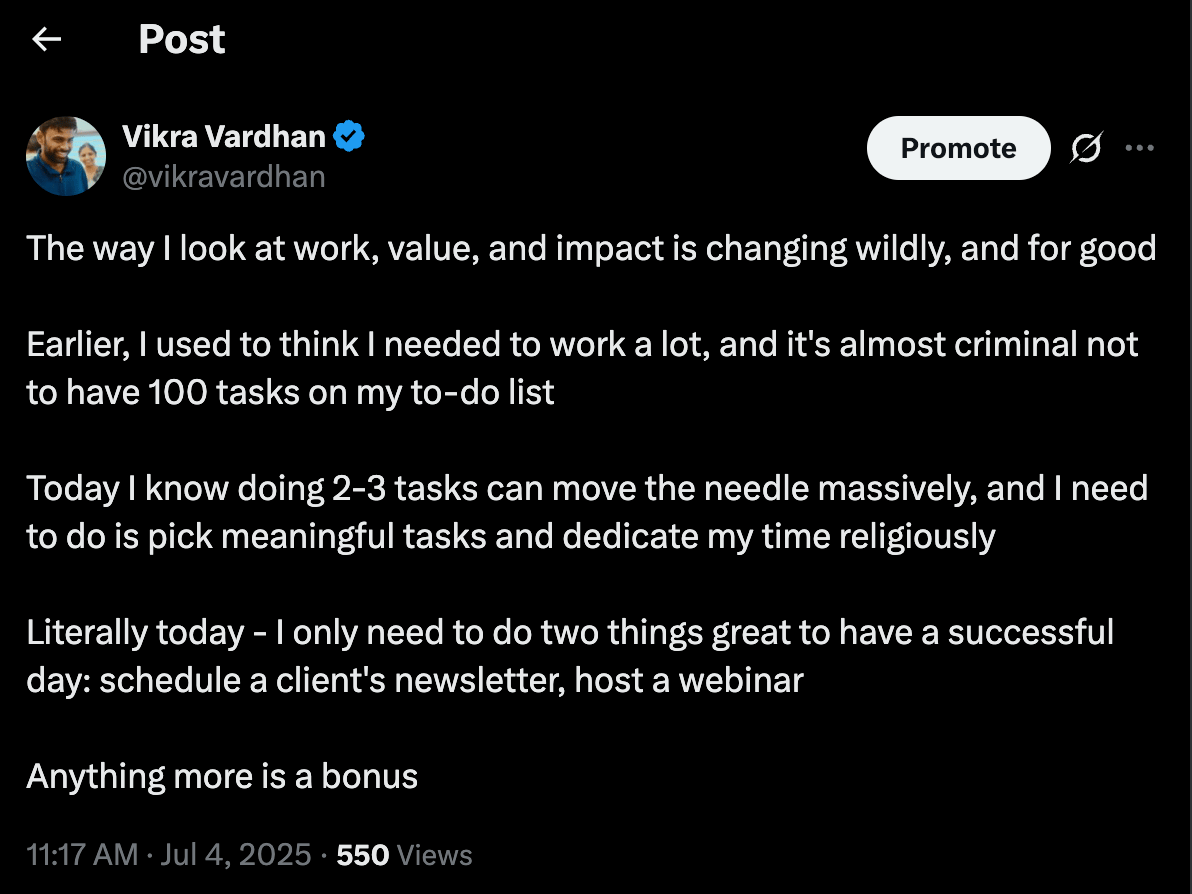
My relationship with work has been under a major transition for the last three months.
There hasn’t been a day I haven’t questioned my methods, perspective, and how I do what I do. But today, I am in a better position to articulate my thoughts.
Three months ago, if you had confronted me with, “You say no to most fun, and I see you on your desk all day. But you don’t seem to be successful.”
I’d burst out in angst and with a trembling voice, I’d respond, “You have no idea what I have been doing. I miss the time with my friends, family, and fun events. I start my day with work. I am mindful of my time. I am always learning. You don’t know how things work in unconventional fields, and you definitely don’t know how hard I have been working all day.”
But am I?


The illusion of hard work
Nikhil Kamath’s lines always stay close to my heart because of how hard they hit me:
Hardwork is not that important.
Hard work gives you the ammunition to say I tried when ego comes attaking why didn’t you make it?
In the capatalistic world, I don’t think there is a correlation between the number of hours you work to how successful you become.
Does this mean hard work has no value? I don’t think so.
But I have been looking at hard work the wrong way. Socially, we are conditioned to believe we don’t deserve results if we didn’t grind enough, whether the task itself requires us to work hard or not.
In my case, the need to project hardship diminished my ability to work smart or apply the Pareto principle[1].
I only need to do a few things right to notice significant results.
In fact, I can name it for you. In a month: 4 issues each on my marketing and personal newsletter, growth, marketing, and partnerships for the coffee newsletter, four Reddit posts, handling 3-4 clients (20-30 hours each), and 3 community events.
That’s it. I do this for six months straight, and I KNOW I will be in a far better position than I am today - with peace, happiness, money, and freedom.
Despite my self-awareness, I make things hard for myself because I am not ready to believe I had a good day if I haven’t ticked a to-do list with 10-15 tasks.
But… things changed in three months, and this is what I think today:


“What caused the shift?” For that, we need to understand the illusion of work
Unfortunately, I love my work.
The paradox of passion is your mind never distinguishes between work and play. Because you don’t see work as work, you spend way too much time working without noticing the exhaustion or the clock. Neuroscience supports this[2].
All the time you spend working feels like meaningful work, but it isn’t.
In my case, any of the tasks I mentioned earlier (writing newsletters, client work, etc.) are meaningful tasks. When I act on them religiously, the needle moves massively in the positive direction.
All the other time, I hop tabs, read, organize my systems, create plans, etc. Yes, these are important, but I am delusionally overinvolved in such tasks. Watching a couple of extra podcasts related to your work feels harmless until you question if that's what you really need right now.
It feels like we’re doing the right things. Especially when you compare it with scrolling reels, binge-watching a show, spending hours in bed, etc.
If this sounds relatable - Sorry to break it to you, you’re not working.
You’re in an illusion of work.

“If you are so self-aware, why aren’t you doing what you’re supposed to be doing? What’s the solution anyway?”
Idk man. To each their own.
Time tracking has been working for me. I track my work hours → divide them into meaningful and non-meaningful hours → review every Monday → optimise next week for more meaningful work.[3]
Also I put money on the line. I deposited 10k in one of my favourite communities. I need to publish three long-form posts a week for 10 weeks straight. If I miss 4/30 posts, I don’t get my money back. Plus I don’t get to attend the next in-person retreat that happens every six months.
I retired a few projects. Example: My blog on newsletters. It’s not a bad project[4] but I have limited energy and time. It creates more time for my priority projects and removes the guilt of abandoning the rest of them.
If I could go back in time, I’d ask myself if I do meaningful work or if I am just delulu.

Footnotes:
[1] Pareto Principle or 80/20 rule states 80% of results come from 20% of actions.
[2] Instead of sharing a complicated case study, watch this reel by a neurologist.
[3] I post about my time on Twitter every Monday. You can see my tweets here.
[4] My blog is another example of the illusion of work. Everything I published on newslettercasestudies.com could have been in my marketing newsletter. It feels harmless to have a separate blog dedicated to newsletter case studies, but the truth is - It could have just been a Google Doc or a tag on my marketing newsletter and STILL BE FINE.